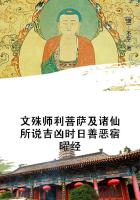A people, it appears, may be progressive for a certain length of time, and then stop: when does it stop? When it ceases to possess individuality. If a similar change should befall the nations of Europe, it will not be in exactly the same shape: the despotism of custom with which these nations are threatened is not precisely stationariness. It proscribes singularity, but it does not preclude change, provided all change together. We have discarded the fixed costumes of our forefathers; every one must still dress like other people, but the fashion may change once or twice a year. We thus take care that when there is a change, it shall be for change's sake, and not from any idea of beauty or convenience; for the same idea of beauty or convenience would not strike all the world at the same moment, and be simultaneously thrown aside by all at another moment. But we are progressive as well as changeable: we continually make new inventions in mechanical things, and keep them until they are again superseded by better; we are eager for improvement in politics, in education, even in morals, though in this last our idea of improvement chiefly consists in persuading or forcing other people to be as good as ourselves. It is not progress that we object to; on the contrary, we flatter ourselves that we are the most progressive people who ever lived. It is individuality that we war against: we should think we had done wonders if we had made ourselves all alike; forgetting that the unlikeness of one person to another is generally the first thing which draws the attention of either to the imperfection of his own type, and the superiority of another, or the possibility, by combining the advantages of both, of producing something better than either. We have a warning example in China- a nation of much talent, and, in some respects, even wisdom, owing to the rare good fortune of having been provided at an early period with a particularly good set of customs, the work, in some measure, of men to whom even the most enlightened European must accord, under certain limitations, the title of sages and philosophers. They are remarkable, too, in the excellence of their apparatus for impressing, as far as possible, the best wisdom they possess upon every mind in the community, and securing that those who have appropriated most of it shall occupy the posts of honour and power. Surely the people who did this have discovered the secret of human progressiveness, and must have kept themselves steadily at the head of the movement of the world. On the contrary, they have become stationary- have remained so for thousands of years; and if they are ever to be farther improved, it must be by foreigners. They have succeeded beyond all hope in what English philanthropists are so industriously working at- in ****** a people all alike, all governing their thoughts and conduct by the same maxims and rules; and these are the fruits. The modern regime of public opinion is, in an unorganised form, what the Chinese educational and political systems are in an organised; and unless individuality shall be able successfully to assert itself against this yoke, Europe, notwithstanding its noble antecedents and its professed Christianity, will tend to become another China.
What is it that has hitherto preserved Europe from this lot? What has made the European family of nations an improving, instead of a stationary portion of mankind? Not any superior excellence in them, which, when it exists, exists as the effect not as the cause; but their remarkable diversity of character and culture. Individuals, classes, nations, have been extremely unlike one another: they have struck out a great variety of paths, each leading to something valuable; and although at every period those who travelled in different paths have been intolerant of one another, and each would have thought it an excellent thing if all the rest could have been compelled to travel his road, their attempts to thwart each other's development have rarely had any permanent success, and each has in time endured to receive the good which the others have offered. Europe is, in my judgment, wholly indebted to this plurality of paths for its progressive and many-sided development. But it already begins to possess this benefit in a considerably less degree. It is decidedly advancing towards the Chinese ideal of ****** all people alike. M.
de Tocqueville, in his last important work, remarks how much more the Frenchmen of the present day resemble one another than did those even of the last generation. The same remark might be made of Englishmen in a far greater degree.
In a passage already quoted from Wilhelm von Humboldt, he points out two things as necessary conditions of human development, because necessary to render people unlike one another; namely, *******, and variety of situations. The second of these two conditions is in this country every day diminishing. The circumstances which surround different classes and individuals, and shape their characters, are daily becoming more assimilated. Formerly different ranks, different neighbourhoods, different trades and professions, lived in what might be called different worlds; at present to a great degree in the same. Comparatively speaking, they now read the same things, listen to the same things, see the same things, go to the same places, have their hopes and fears directed to the same objects, have the same rights and liberties, and the same means of asserting them. Great as are the differences of position which remain, they are nothing to those which have ceased. And the assimilation is still proceeding. All the political changes of the age promote it, since they all tend to raise the low and to lower the high. Every extension of education promotes it, because education brings people under common influences, and gives them access to the general stock of facts and sentiments. Improvement in the means of communication promotes it, by bringing the inhabitants of distant places into personal contact, and keeping up a rapid flow of changes of residence between one place and another. The increase of commerce and manufactures promotes it, by diffusing more widely the advantages of easy circumstances, and opening all objects of ambition, even the highest, to general competition, whereby the desire of rising becomes no longer the character of a particular class, but of all classes. A more powerful agency than even all these, in bringing about a general similarity among mankind, is the complete establishment, in this and other free countries, of the ascendancy of public opinion in the State. As the various social eminences which enabled persons entrenched on them to disregard the opinion of the multitude gradually become levelled; as the very idea of resisting the will of the public, when it is positively known that they have a will, disappears more and more from the minds of practical politicians;there ceases to be any social support for nonconformity- any substantive power in society which, itself opposed to the ascendancy of numbers, is interested in taking under its protection opinions and tendencies at variance with those of the public.
The combination of all these causes forms so great a mass of influences hostile to Individuality, that it is not easy to see how it can stand its ground. It will do so with increasing difficulty, unless the intelligent part of the public can be made to feel its value- to see that it is good there should be differences, even though not for the better, even though, as it may appear to them, some should be for the worse. If the claims of Individuality are ever to be asserted, the time is now, while much is still wanting to complete the enforced assimilation. It is only in the earlier stages that any stand can be successfully made against the encroachment. The demand that all other people shall resemble ourselves grows by what it feeds on. If resistance waits till life is reduced nearly to one uniform type, all deviations from that type will come to be considered impious, immoral, even monstrous and contrary to nature. Mankind speedily become unable to conceive diversity, when they have been for some time unaccustomed to see it.















